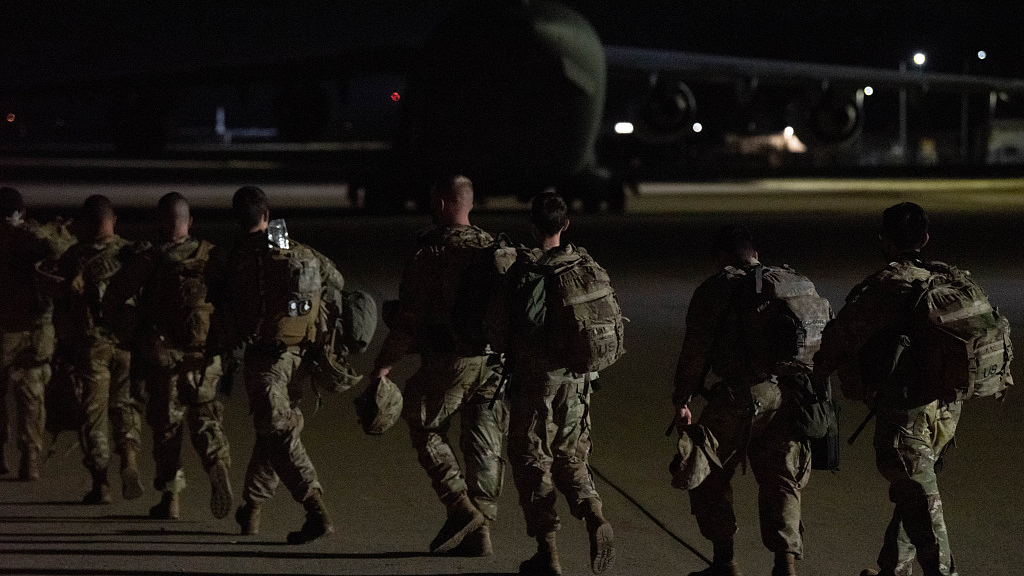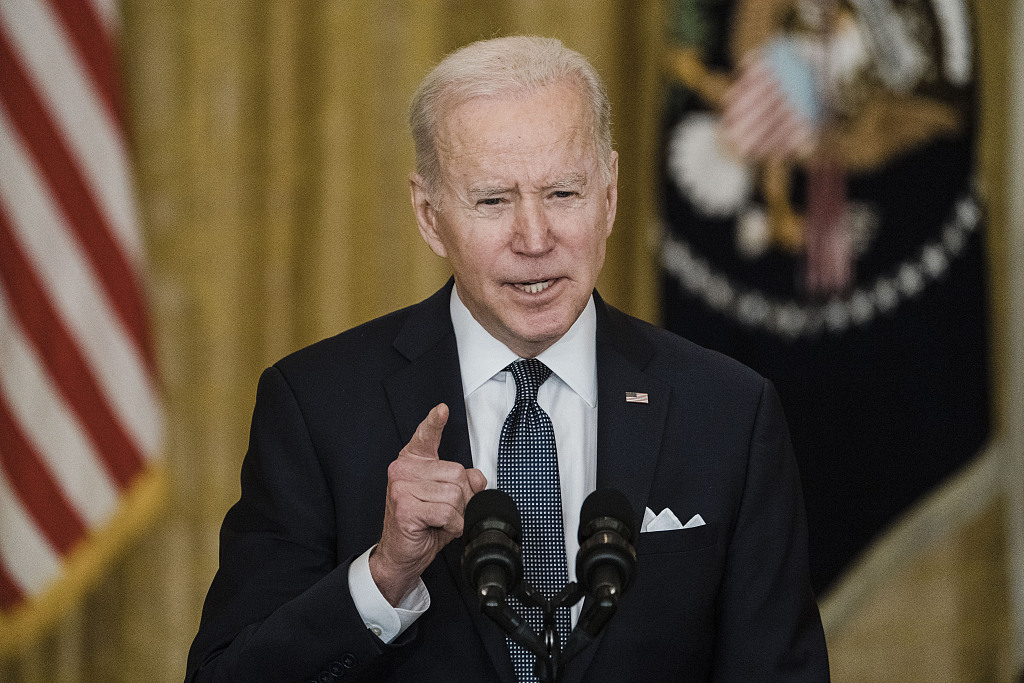
Soldiers with the 101st Airborne Division of the U.S. Army prepare to depart Fort Campbell en route for Poland in Fort Campbell, Kentucky, U.S. February 16, 2022. /CFP
Soldiers with the 101st Airborne Division of the U.S. Army prepare to depart Fort Campbell en route for Poland in Fort Campbell, Kentucky, U.S. February 16, 2022. /CFP
Editor's note: Azhar Azam is a market and business analyst who writes about geopolitical issues and regional conflicts. The article reflects the author's opinions and not necessarily those of CGTN.
Kyiv does not have any strategic significance for Washington; it is of clear strategic importance for Moscow. Ukraine was part of the Soviet Union for centuries and the two sides are fastened with a strong cultural, historic, ethnic and linguistic relationship. Many Ukrainians intrinsically have linked themselves with the Kremlin and take pride in sharing the same heritage.
For more than one month, from November 22 to December 26, the Orange Revolution dominated the world news in 2004 over the U.S. and NATO's sustained meddling in the country. Russia was well clued-up on that the orange-bedecked protesters were America's creation. The Russian President Vladimir Putin had called out Washington for pursuing a foreign policy packaged in "beautiful, pseudo-democratic phraseology."
Between 2000 and 2004, the campaign – orchestrated and funded by the U.S. – deployed consultancies, pollsters, diplomats and nonpartisan groups to overthrow governments in four countries in four years. Washington bankrolled opposition websites, sponsored exit polls and hired experts to organize focus groups and advise catchy slogans and punchy logos to mobilize young street protesters. The dingy U.S. strategy brought down governments in Belgrade and Tbilisi; it failed in Minsk and Harare.
In Kyiv, the U.S.-led coalition skated on thin ice by giving the Western nod and big bucks to the opposition leader Viktor Yushchenko. The half-assed intervention meant Ukraine was turned into a geostrategic issue by the U.S., which sought to quarantine Russia and pull every former Soviet republic into its orbit. The new president in 2005 promised to lean toward NATO, yet in an indication of rapprochement with Russia, the very next year appointed the pro-Moscow Viktor Yanukovych as prime minister, capping the gains of the U.S.-backed "chestnut revolution."
NATO in 2008 vowed Ukraine would one day join the organization. But Kyiv's incorporation into the security alliance was unacceptable to Russia for it will be akin to making the Black Sea a NATO lake. The NATO commitment also held out the possibility of blocking Russian access to one of the two major ports, Sevastopol, with grave national security consequences.
So, the West should seriously consider addressing Moscow concerns as these key considerations triggered the Georgia-Russia war in 2008. The U.S. deployment of a missile defense system in Romania, threatening Russian security, in 2011 made things worse over Moscow's belief Crimea and Sevastopol could develop into another American platform for strikes on Russia.
Yanukovych won the 2010 presidential election which was termed as fair and "truly competitive" by European observers. Ukraine in November 2013 plunged into crisis once the government dropped plans to sign the Association Agreement with the European Union and proposed a three-way trade commission, including resolving trade disputes. Although Putin wasn't against Kyiv's "sovereign choice," the decision led the way to the Euromaidan movement by supporters of the fallen-through deal.
However, there were some other reasons behind the suspension of the association and trade pact. Ukraine's economy was in limbo and had to put the treaty on hold until it found a solution and a decline in industrial production and relations with the Commonwealth of Independent States were "compensated" for by the European market. In addition, the Ukrainian parliament couldn't build consensus on another irritant, the EU demand to release the jailed opposition leader, Yulia Tymoshenko.

President Joe Biden delivers remarks in the East Room of the White House on the situation with Russia and Ukraine in Washington, D.C., February 15, 2022. /CFP
President Joe Biden delivers remarks in the East Room of the White House on the situation with Russia and Ukraine in Washington, D.C., February 15, 2022. /CFP
Russia is singled out for carrying out aggression on Ukraine's border. But by provoking and trying to round up Moscow, Washington and its allies bear the major responsibility for the crisis. The coup against the elected Ukrainian president, Putin suspected, was an attempt to integrate Ukraine into the West and establish a NATO naval base in Crimea to keep tabs on Russia.
Washington's narcissism to have a pro-western government in Kyiv, the U.S. official's blunt acknowledgment of investing over $5 billion in Ukraine since 1991, and support to drive Yanukovych out from power blew the whistle for Moscow.
All the U.S.-led efforts in Ukraine were not designed to make the country democratic; they aimed to bring Kyiv into the West's bastion, assimilate the country into NATO and tap its proximity to Moscow to NATO's advantage. The grand strategy to ignite civil war floundered, but that's how Washington has been pursuing a ruthless policy under the pretense of democracy, freedom and rights.
The latest Russia-Ukraine tensions are the continuation of the 2014 crisis. Kyiv is feeling the heat. Following the warning by U.S. President Joe Biden that the Kremlin could attack Kyiv, Ukrainian President Volodymyr Zelenskyy warned the "respected leaders of the states" not to create "panic" and risk his country's economy. Still, America is threatening Russia with "horrific" consequences without showing any flexibility on Russian security concerns and legitimate demands, including denying Ukraine enrollment in NATO and stopping the alliance's expansion eastward.
A White House readout expresses a desire for a diplomatic solution while the Biden administration in practice doesn't intend to resolve the crisis peacefully as it continues to hype up the situation. We should remember that no country can exert a sphere of influence on others. In order to prevent a playback of 2014, America and NATO must put the kibosh on their dirty game, positively review Russian demands and engage Moscow in a constructive, results-driven dialogue.
(If you want to contribute and have specific expertise, please contact us at opinions@cgtn.com.)

